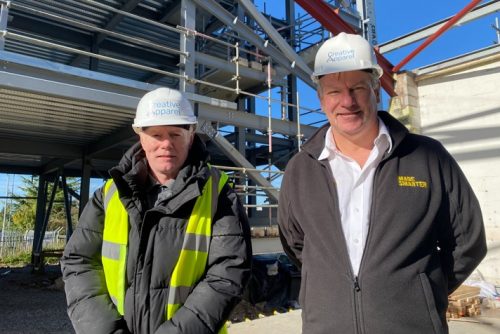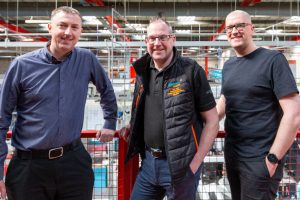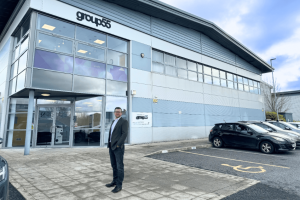Clothing company expanding with plans to create 50 jobs

A clothing manufacturer, supported by Made Smarter, is aiming for green growth through sustainable style with a ground-breaking smart eco-factory.
Creative Apparel is set to open the new state-of-the-art facility in Stockport, a mile away from its current base, in 2022.
It is investing in full factory digitalisation where a central IT system drives and measures smart machinery, linking production through to its customers and supply chain.
Renewable energy sources including rainwater harvesting, solar power, wind turbines, air-source heating and eco fans will support the introduction of modern, high tech machinery to enable a more sustainable approach to production.
Made Smarter, the Government-led industry-backed technology adoption programme, has supported Creative Apparel with a £20,000 grant for a data and systems integration project that will automate and speed up the process of receiving orders, right through to production management and dispatch.
Meanwhile, the business has secured a further £20,000 for a project which uses artificial intelligence (AI) tools to collect fashion data from social media influencers and other sources, enabling designers to respond quicker and more effectively to trends.
The business’s ongoing partnership with Made Smarter also includes taking advantage of its digital internship scheme, which matches undergraduates, Master’s and PhD students with manufacturers to work on live projects.
Established in 1988 as a two-person screen printing operation, Creative Apparel now employsmore than 80 people and produces around 50,000 items of clothing each week for the fast fashion industry, specialising in screen printing and embroidery.
Managing director, Phil Millar, believes putting technology at the heart of growth plans will increase turnover four-fold within five years, and create 50 high value jobs.
Productivity is forecast to increase by 30%, and waste is set to reduce by 20%, but crucially, the business will lessen the environmental and social impact of the clothes they make.
Phil said: “The fast fashion industry suffers from a reputation as one of the most damaging to the environment due to the amount of waste generated during the production process and the throw-away nature of many of the products.
“We want to help address that by becoming a leader for change in the sector by putting sustainability at the heart of our production processes.
“By introducing digital technology and tools that reduce waste and consume less energy we want to prove that you can help save the planet and can save money.”
He added: “Accessing support from Made Smarter is helping us accelerate faster towards our vision.”
Since its launch in 2019 Made Smarter’s Adoption Programme in the North West has worked with more than 1,200 businesses, including many in the textile sector, offering expert, impartial technology advice, digital transformation workshops to help manufacturers take their first steps, a leadership programme, and funded digital technology internships.
The programme has supported more than 200 technology projects which are forecast to deliver an additional £176m in GVA for the North West economy over the next three years, create more than 920 jobs, and upskill 1,764 existing roles.
Alain Dilworth, North West Adoption Programme manager at Made Smarter, said: “As the COP26 United Nations climate change conference meets in Glasgow, the focus of the world is on how we live more sustainably.
“As one of the biggest greenhouse gas-emitting sectors of the UK economy, the manufacturing industry has a vital role in reducing emissions.
“Digitalisation offers a huge opportunity for manufacturers to deliver operational efficiencies, decarbonise heat and power, optimise design and materials, and improve logistics and transport, benefitting their business, their bottom line and the environment.
“Creative Apparel is a fantastic example of a Made Smarter-supported business which has found the sustainability sweet spot between these economic, social, and environmental goals.”
He said: “Creative Apparel are keen to demonstrate what a future factory will look like and the breadth and scope of the entire project is visionary, bringing imaginative solutions to everyday problems. I genuinely cannot wait to see this come to life and I hope this encourages other manufacturers to consider what digital can do for them.”








